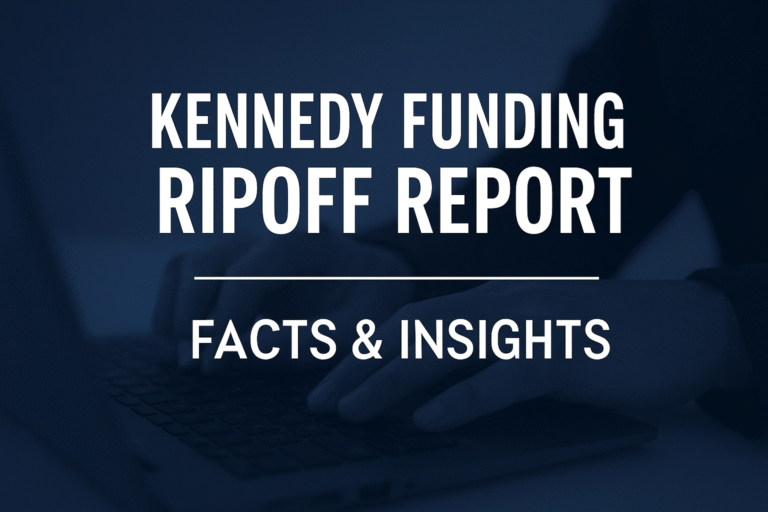The phrase kennedy funding ripoff report often appears in search results for people researching private lending companies. For potential borrowers, it can be confusing to see such a phrase attached to a financial firm that promotes itself as a direct hard-money lender. This article explains what that phrase refers to, the types of complaints typically found under it, how to distinguish between online chatter and verified facts, and the steps you can take to protect yourself before entering into any loan agreement.
What Kennedy Funding Presents to the Market
Kennedy Funding is a private lender that emphasizes land loans, commercial bridge loans, and funding for non-traditional real estate projects. Marketing materials highlight large loan volumes and international reach. This visibility means that whenever concerns arise, they spread widely online. For that reason, the term kennedy funding ripoff report becomes a magnet for people searching for both praise and criticism of the company.
What a kennedy funding ripoff report Actually Means
When readers search for kennedy funding ripoff report, they are usually directed to complaint boards, consumer websites, or personal blog posts. These are spaces where borrowers share frustrations, particularly when a loan does not close or when upfront fees appear to be lost. Some reports describe experiences in which borrowers felt misled, while others mention communication issues. Because such platforms rely on user submissions, they are not official evidence. Still, they reflect real borrower concerns and are worth examining.
Common Themes in Complaints
Posts that surface under kennedy funding ripoff report often repeat a few recurring issues:
- Upfront fees and refunds: Borrowers report paying commitment or application fees they later believed were non-refundable.
- Loans not closing: Some deals fail at the final stage, leading to frustration about time and money lost.
- Contract clarity: Allegations sometimes focus on unclear promises versus what was written in contracts.
These issues are not unique to one lender; they are frequent pain points in the hard-money lending sector. Understanding them helps borrowers prepare better.
Documented Disputes in Court
Beyond online complaint pages, there are court cases that show real disputes between lenders and borrowers. In some matters involving Kennedy Funding, lawsuits were filed over commitment fees, failed closings, and breach-of-contract claims. Judges have occasionally ordered refunds, while in other cases, the lender has enforced its rights through foreclosure. These documented cases prove that disagreements do occur, but outcomes depend on contracts and the specifics of each transaction. When evaluating a kennedy funding ripoff report, always look for court records, as they provide verifiable details.
How to Interpret Online Reports
A single kennedy funding ripoff report may not tell the whole story. To evaluate credibility, ask:
- Does the report include actual documents such as contracts, receipts, or emails?
- Is there a case number that ties the claim to a legal filing?
- Are multiple, independent complaints describing the same issue?
If the answer is yes, then the concern deserves more weight. If not, it may be a personal dispute or a miscommunication amplified online.
Checking Reputational Profiles
Business directories and consumer platforms sometimes show summaries of complaints and whether the company responded. For example, some profiles of Kennedy Funding show a mixture of resolved and unresolved concerns. These sites are useful for identifying patterns, but they should not be the sole factor in your decision. Consider them part of a larger due diligence process.
Practical Tips Before Borrowing
If you are considering any private lender, including Kennedy Funding, follow these steps to avoid the need for your own kennedy funding ripoff report:
- Demand clarity in writing: Ensure fee terms are explained, especially whether they are refundable.
- Request proof of past closings: Ask for similar transaction examples.
- Keep thorough records: Save every email and signed document.
- Seek legal review: An attorney can highlight risk areas before you commit funds.
Being proactive reduces the risk of disputes and helps protect your capital.
How Lenders Typically Respond
When faced with online complaints, many lenders provide rebuttals, clarifications, or evidence that a borrower misunderstood the terms. Sometimes the issues are settled privately, while others escalate into lawsuits. If you encounter a kennedy funding ripoff report with no response or documentation, treat it cautiously, but do not assume it represents the whole company’s practice.
Checklist Before You Sign
- Review the commitment letter word by word.
- Ask specifically which fees are refundable and under what conditions.
- Verify the lender’s license and physical address.
- Consult independent experts if the deal size is large.
This checklist can prevent surprises and lower the risk of disputes.
Conclusion
The phrase kennedy funding ripoff report attracts attention because it combines a recognizable lender’s name with strong language. While online complaints should not be dismissed outright, they should be weighed alongside court records, official documents, and clear contractual language. Borrowers who take time to document, verify, and seek professional advice will be better prepared to navigate private lending deals and avoid unpleasant surprises.
Frequently Asked Questions
1. What is a kennedy funding ripoff report?
It usually refers to an online complaint or discussion about disputes with the lender, often focused on fees or failed closings.
2. Are online ripoff reports always accurate?
No. They reflect individual experiences and may not be verified; always check official records.
3. What issues appear most often in these reports?
Commitment fees, refund disputes, and deals that did not close are the most common themes.
4. How should I protect myself before borrowing?
Get everything in writing, confirm refund policies, and seek legal review before paying upfront fees.
5. Should I avoid Kennedy Funding because of online complaints?
Not necessarily; evaluate verified records, contracts, and independent profiles before making a decision.

